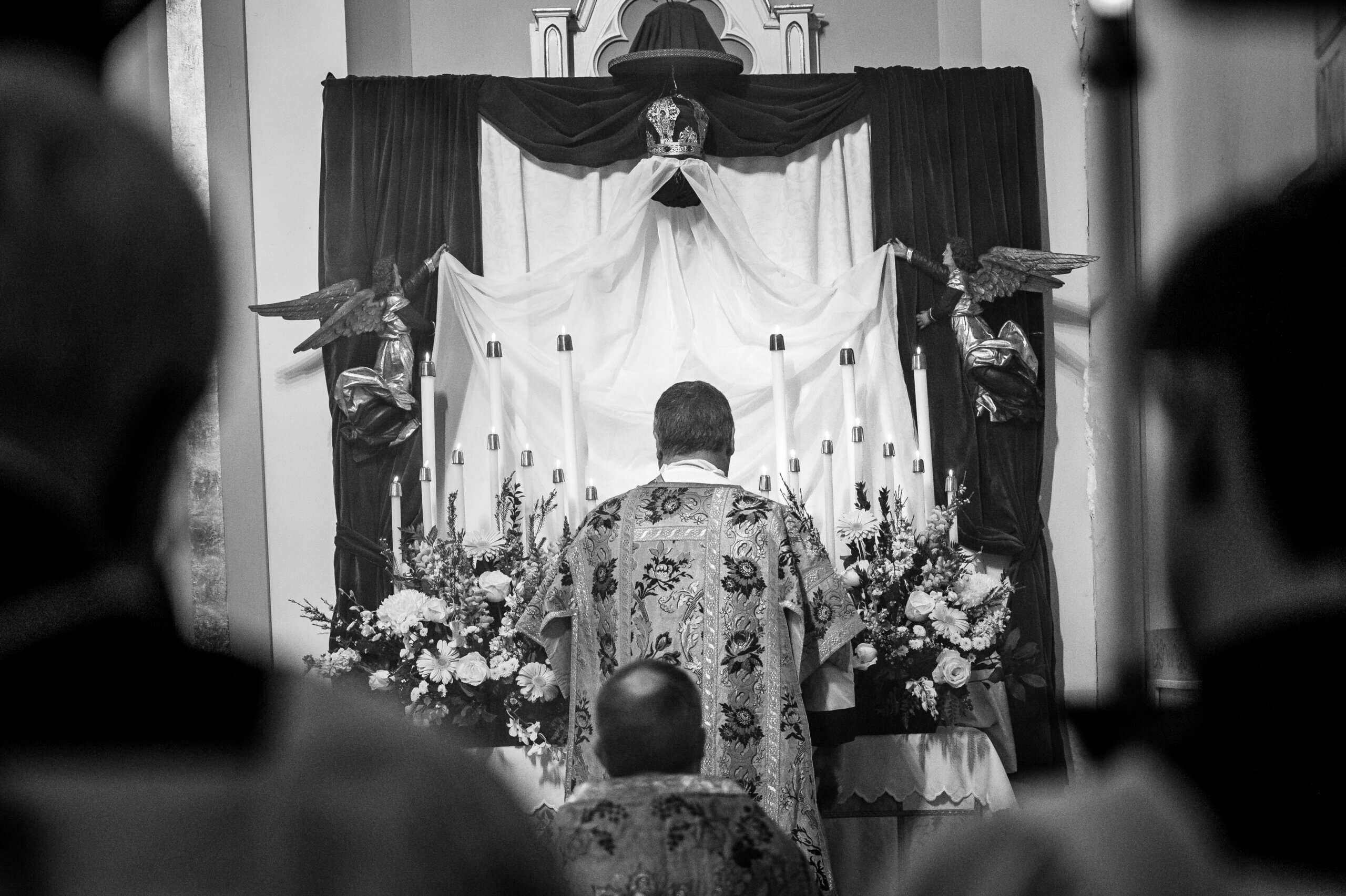Above: Mass of Holy Thursday. Photo by Allison Girone.
St. Mark Catholic Church in Huntersville, N.C., offered its final Traditional Latin Mass last Friday, March 31, 2023, at 12:30 p.m. The announcement in the March 26 bulletin of the parish read as follows: “In light of the recent responsum from the Dicastery of Divine Worship in Rome, the Traditional Latin Mass will no longer be offered at St. Mark.”
Ten years ago, Chris Lauer was instrumental in working to bring a regular Traditional Latin Sunday Mass to the area at the original Latin Mass parish, St. Ann’s.
“At first, attendance was around 150 people, but in the decade since, attendance has more than doubled, and at times, has swelled to above 500,” Lauer said. “The 12:30 p.m. Latin Mass is now the highest attended Mass at St. Ann’s.”
Lauer explained that the parish has also had weekday Latin Masses on Mondays, Wednesday and Fridays as well as holy days of obligation and feast days throughout the year. “We have also had the Easter Triduum and Sacraments using the traditional Rituale Romanum for baptisms, Confirmations, Nuptials and Requiems,” he said.
St. Thomas Aquinas parish in Charlotte is also home to a Sunday Traditional Latin Mass in Charlotte that has been offered at 11:30 a.m. since 2021 according to Steve Cunningham, a parishioner at St. Thomas Aquinas who also heads up Sensus Fidelium. The congregation initially consisted of parishioners who attended the 11:30 a.m. Mass before it became the Traditional Latin Mass according to Cunningham. “I remember one lady saying that initially she didn’t know what was going on, but opined ‘This is beautiful,’’’ Cunningham said.
The parish also offers the Traditional Latin Mass for Holy Days, Thursday evenings and includes a First Saturday Sung Mass.
St. Ann’s Lauer elaborated that the early efforts just 10 short years ago have harvested an abundance of fruit as the Traditional Latin Mass spread to many more locations in Charlotte. Priests and laity who experienced the Traditional Latin Mass and Sacraments at St. Ann’s “went home and started or expanded Latin Masses at their own parishes,” Lauer said. “There are now several thousand families attending the Traditional Latin Mass at more than a dozen diocesan locations in the region,” he said.
Where to Find the Triduum?
As Holy Week is upon Catholics in the area, families who previously had access to the full Easter Triduum in the Traditional rite are praying and wondering where they will attend Maundy Thursday, Holy Friday and Easter liturgical services in 2023.
“There are ominous clouds on the horizon right now for sure,” said Cunningham of St. Thomas Aquinas.
I cannot speak for everyone, but I grew up with a sports mindset and my coaches and Dad always talked about never having it easy, embracing the suck and fighting through adversity. No excuses. Just get it done. Hopefully, more will take the route of Holy Job ‘the Lord giveth the Lord taketh away, blessed be the name of the Lord’ and other examples of saints who had Holy Mother Church punish their children whether justly or unjustly.
“We suspect the cancellations are just beginning,” Lauer said. “And early last year [2022], the traditional Sacrament of Confirmation and Traditional Easter Triduum were stripped from our community.”
So where will Catholics who have had the opportunity to celebrate the fullness of the Easter Triduum in the traditional rite over the past several years go for their Easter celebration this year?
There are at least a couple of alternatives. The Society of St. Pius X (SSPX) has a chapel that will offer the full Easter Triduum according to the 1962 liturgical books at their Mount Holly, N.C., St. Anthony’s chapel near Charlotte. Lauer said he suspects that some families may choose that route for the Triduum.
“There have been homilies recently at St. Ann’s warning that while the SSPX Masses are valid and that their priests do have limited faculties directly from the Pope, their canonical status remains irregular,” Lauer said. Lauer explained that in 2017, when Pope Francis granted the SSPX faculties for the celebration of marriages, the Holy Father went further by officially expressing his intent to facilitate ‘full institutional regularization’ of the SSPX.
“The Holy Father’s statement shows the mind of the Church on the subject,” Lauer said. Many are heartened also to learn that the SSPX priests include the proscribed prayers for the Bishop and the Pope in the Canon of their Masses.
Meanwhile, Cunningham said that he and his family would instead attend the fourth century Byzantine liturgy offered at St. Basil’s in Charlotte. “It’s pre-1955,” he pointed out, with a smile, “I try to stay away from Bugnini Triduums which the ’62 is.”


